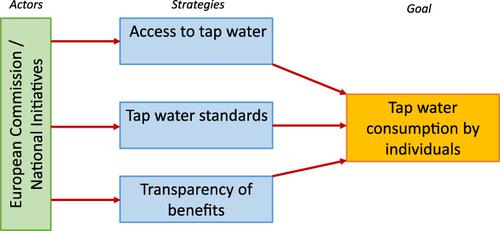当前位置:
X-MOL 学术
›
WIREs Water
›
论文详情
Our official English website, www.x-mol.net, welcomes your
feedback! (Note: you will need to create a separate account there.)
Making Europe go from bottles to the tap: Political and societal attempts to induce behavioral change
WIREs Water ( IF 6.8 ) Pub Date : 2020-03-23 , DOI: 10.1002/wat2.1435 Jale Tosun 1 , Ulrike Scherer 2 , Simon Schaub 1 , Harald Horn 2, 3
WIREs Water ( IF 6.8 ) Pub Date : 2020-03-23 , DOI: 10.1002/wat2.1435 Jale Tosun 1 , Ulrike Scherer 2 , Simon Schaub 1 , Harald Horn 2, 3
Affiliation

|
In several European countries and at the level of the European Union, we can observe political and societal attempts to promote the use of tap water. Most prominently, the European Commission proposed revisions for the Drinking Water Directive, which includes strategies for promoting the consumption of tap water. The strategies comprise the following: improving access to tap water, upgrading quality standards for tap water, and enhancing transparency concerning the benefits of tap water. National initiatives in European countries pursue similar strategies that concentrate on enhancing access to tap water and communicating its economic, environmental, and social benefits. By drawing on existent literature in different disciplines, we assess how promising these strategies are for inducing individuals to drink tap water rather than bottled water. Our overview reveals that our knowledge regarding the quality dimension is very good: numerous studies on European countries have shown that dissatisfaction with the sensory properties and health‐related concerns prevent individuals from drinking (more) tap water and opting for bottled water instead. The body of research with a specific focus on Europe is significantly smaller concerning the other two dimensions: access to tap water and the benefits of tap water. Nonetheless, there is indicative and preliminary evidence that improved access to tap water and a better communication of the benefits of tap water could positively affect consumption patterns.
中文翻译:

使欧洲从瓶装酒到水龙头:引发行为改变的政治和社会尝试
在几个欧洲国家和欧盟一级,我们可以观察到政治和社会上试图促进自来水使用的尝试。最突出的是,欧洲委员会提议对《饮用水指令》进行修订,其中包括促进自来水消费的策略。这些策略包括以下内容:改善自来水的获取,提高自来水的质量标准以及提高有关自来水利益的透明度。欧洲国家的国家计划采取了类似的战略,这些战略着重于增加自来水的获取并传达其经济,环境和社会效益。通过利用不同学科中的现有文献,我们评估了这些策略在诱导个人饮用自来水而不是瓶装水方面的前景如何。我们的概述表明,我们对质量的了解非常好:对欧洲国家的众多研究表明,对感官特性和与健康相关的关注的不满会阻止人们饮用(更多)自来水,而是选择瓶装水。在其他两个方面,针对欧洲的研究机构的规模要小得多:获得自来水和自来水的好处。尽管如此,有指示性和初步的证据表明,改善自来水的获取和更好地传达自来水的好处可以对消费方式产生积极影响。对欧洲国家的众多研究表明,对感官特性和与健康相关的关注的不满会阻止人们饮用(更多)自来水,而是选择瓶装水。在其他两个方面,针对欧洲的研究机构的规模要小得多:获得自来水和自来水的好处。尽管如此,有指示性和初步的证据表明,改善自来水的获取和更好地传达自来水的好处可以对消费方式产生积极影响。对欧洲国家的众多研究表明,对感官特性和与健康相关的关注的不满会阻止人们饮用(更多)自来水,而是选择瓶装水。在其他两个方面,针对欧洲的研究机构的规模要小得多:获得自来水和自来水的好处。尽管如此,有指示性和初步的证据表明,改善自来水的获取和更好地传达自来水的好处可以对消费方式产生积极影响。
更新日期:2020-03-23
中文翻译:

使欧洲从瓶装酒到水龙头:引发行为改变的政治和社会尝试
在几个欧洲国家和欧盟一级,我们可以观察到政治和社会上试图促进自来水使用的尝试。最突出的是,欧洲委员会提议对《饮用水指令》进行修订,其中包括促进自来水消费的策略。这些策略包括以下内容:改善自来水的获取,提高自来水的质量标准以及提高有关自来水利益的透明度。欧洲国家的国家计划采取了类似的战略,这些战略着重于增加自来水的获取并传达其经济,环境和社会效益。通过利用不同学科中的现有文献,我们评估了这些策略在诱导个人饮用自来水而不是瓶装水方面的前景如何。我们的概述表明,我们对质量的了解非常好:对欧洲国家的众多研究表明,对感官特性和与健康相关的关注的不满会阻止人们饮用(更多)自来水,而是选择瓶装水。在其他两个方面,针对欧洲的研究机构的规模要小得多:获得自来水和自来水的好处。尽管如此,有指示性和初步的证据表明,改善自来水的获取和更好地传达自来水的好处可以对消费方式产生积极影响。对欧洲国家的众多研究表明,对感官特性和与健康相关的关注的不满会阻止人们饮用(更多)自来水,而是选择瓶装水。在其他两个方面,针对欧洲的研究机构的规模要小得多:获得自来水和自来水的好处。尽管如此,有指示性和初步的证据表明,改善自来水的获取和更好地传达自来水的好处可以对消费方式产生积极影响。对欧洲国家的众多研究表明,对感官特性和与健康相关的关注的不满会阻止人们饮用(更多)自来水,而是选择瓶装水。在其他两个方面,针对欧洲的研究机构的规模要小得多:获得自来水和自来水的好处。尽管如此,有指示性和初步的证据表明,改善自来水的获取和更好地传达自来水的好处可以对消费方式产生积极影响。











































 京公网安备 11010802027423号
京公网安备 11010802027423号